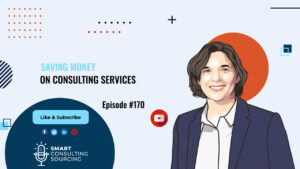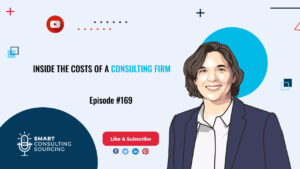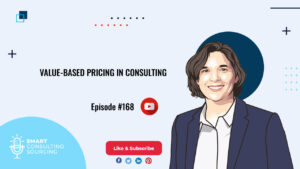Hi there, listeners! A warm welcome to the third episode of your favorite series: “How to buy consulting services like a pro.” In this episode, we will tell you why writing an RFP for consulting services pays off.
But as you already know, we will jump into today’s topic not before giving you a proper recap of the previous episode.
In the last episode, we discussed the value consultants bring to their clients, and it’s clear that they provide tremendous technical and political benefits. Their expertise allows them to offer external insight, accurately diagnose problems and formulate solutions, construct actionable plans for improvement initiatives, and assist in implementing those strategies.
But consultants also help to legitimize decisions and encourage stakeholders to set their differences aside and reach a consensus on various issues. They act as advisors for top leadership while enforcing unpopular yet necessary changes required during cost-cutting or restructuring projects. That is what we refer to as political value.
Consulting can be a powerful value-creation lever, but measuring that value is not always easy. Luckily, there are many ways to measure the impact of consulting services on a company or project. Direct value includes savings and productivity enhancements, while long-term benefits include sustainability growth and decreased risks over time. Cost avoidance measures can demonstrate precisely how much cash has been saved compared to what would likely be spent otherwise.
As a procurement leader, it’s your responsibility to secure the best value for your organization. Yet finding this solution is far from easy-peasy; you must also consider cost avoidance and overall deliverables in addition to looking for the most cost-effective solution.
To attain success, four key aspects must remain at the forefront of your search – ensuring the ability and fit of consultant teams, obtaining impactful outcomes from beginning to end through comprehensive RFPs (requests for proposal), and sourcing fast and cost-effectively within the budget!
Missed our incredible episode of Smart Consulting Sourcing last week? No worries! Our podcast is available on Spotify, iTunes, and YouTube for your convenience. If you’re looking for something else this time, please check out our website, where the full transcript can be found in the Thought Leadership Section.
And Now It is Time to Delve into This Episode’s Exciting Topic: Why an RFP Is Essential for Consulting Services.
We’ve worked hard to keep this discussion brief as there is so much to share about consulting RFPs – but an extra-long episode may not be
Let’s Get Started With the Basics: What Is An RFP?
An RFP is a request for a proposal. It’s a document companies issue to external consultants as part of their sourcing process to describe the work. It usually contains information about the scope of work, timeline, budget, criteria for selecting a consultant, and other project details.
Now Let’s Delve Deeper -Why Is It Essential to Clearly Outline Your Requirements in an RFP?
RFP has several unique purposes:
The primary purpose is it ensures that you and the consultants mutually understand expectations. Doing this will also help ensure everyone remains on the same page about objectives, timelines, and deliverables.
Only once you have described and agreed on your expectations can you tell the consulting firm you need to work with. Here’s an example.
Let’s imagine you want to improve how you manage your innovation portfolio. Now you already have a dedicated group in charge of innovation with processes in place and need a boost or a refresh. You don’t need consultants to transfer knowledge or train your teams. You need a diagnostic and an actionable improvement plan.
But if your teams are new and inexperienced, that will be a different story altogether. Even though appearing similar on paper, these two projects will have different deliverables and might end up with different consulting firms.
Moreover, it is essential to ensure that the consulting firm guarantees results instead of means. The only way to guarantee that? Describe precisely what you need in terms of results!
The following reason is that it will specify the ‘when’ and the ‘how long.’ The duration of a project is a balance between the content covered in the scope and the staffing allocated to the project. To ensure that the consultants you’re working with have adequate resources for your project, it’s important to communicate clear expectations. For example, if you want your project completed within 4 weeks and expect a specific scope of work, make this known early on. Otherwise, there is a risk they may only be able to deliver in 6 weeks, given their bandwidth constraints.
Last but certainly not least, the impact will reflect the feasibility of the scoping. Why is it so important? Because if you don’t lay down your expectations on paper, you will never know what accurate results you can reasonably expect.
Imagine you want to explore new markets for a new technology you just developed. You decide not to write an RFP because you don’t listen to my podcast and agree with the consulting firm that you want to explore opportunities in new markets. The consulting firm, an expert in the field, knows immediately that you should focus on adjacencies and markets close to your core business. That’s how they build their proposal. Then you’ll be disappointed, and you and they will have lost time and money. Now let’s put some time constraints on the launch of your project… Now you get it.
So indeed, defining an RFP ensures that the consultants understand your needs and not only submit a proposal that answers your needs and start the project on the right foot.
The Other Advantages to Writing an RFP for Consulting
As we delve deeper into this topic, we will discover many other advantages of having an RFP for consulting.
One crucial reason is Change Management. The scope of a project will determine what stakeholders will be impacted by the outcomes. If you have been around for a bit, you know that managing the change for a project should start as soon as possible.
Now, let’s imagine you are the project sponsor and decide to launch a project to improve your processes. You’ve identified the consulting firm you want to collaborate with and copied/pasted an old RFP. But there may be a surprise lurking around the corner! Suppose some minor stakeholders have been left out of discussions until after an RFP has gone through. In that case, they could put up roadblocks that stunt any progress made on project goals – meaning what should be smooth sailing is suddenly treading rough water. To guarantee success early, it’s essential to look at every stakeholder involved in decision-making, even the minor ones, and anticipate the project’s impact on them (and vice versa). And the scoping of the project is an excellent opportunity for that. It is about taking advantage of the process to manage the change most efficiently.
The second advantage relates to the price. The breadth of a project directly impacts the timing of a project, the workload of the consultants, the staffing required, and, as a result, the price. But you can’t leave the scope and expectations of your projects up in the air, as it only leads to confusion and insecurity. To factor in any potential risk associated with such unclear objectives, consultants often add a ‘cushion’ into their pricing structure. Now, allow me to share a true story with you.
I recently worked on an assignment where my client wanted to collaborate with a notable consulting firm from the Big 4 or MBB for political reasons – does this sound familiar? If so, it’s likely because we discussed it last week! So, we were able to reduce the overall cost of the consulting firm by a substantial 40% with design to cost. As opposed to going from the scope of work and arriving at an estimate, this approach works in reverse: creating a proposal within your given budget.
I have the senior partner on the phone, and he tells me: “We prefer working in a situation like this, you know? We feel much more comfortable when the client knows what he wants, and everybody is on the same page!” Mind you, even the big consulting firms like a good RFP. Interesting, right?
All the advantages of RFP for Consulting mentioned earlier should be paramount for any strategy, operations, HR, or other functional leaders. This is essentially classic project management principles applied to consulting. The same rigorous standards you apply to your in-house projects should be applied when selecting external consultants. It’s that easy!
RFP For Consulting – What It Means for Procurement?
Now, let’s focus on procurement for a bit. Here, we are going to discuss fair competition and contract management.
Your incumbents will be advantaged if you don’t provide specific information regarding the project’s background and context. To ensure fairness in your selection process for new consulting firms, it is essential to set out a comprehensive RFP. If you want to expand your panel of consulting firms, including Tier 2 and Tier 3 companies, but don’t give those newcomers enough information in the RFPs, all your efforts will be futile. Put plainly: You’re “pissing in a violin,” as we say very elegantly in France.
If you are looking to fill the box and do not plan on taking your time in evaluating each firm, don’t bother with a competition process. Replying to an RFP is energy-consuming and costly for consulting firms — both of which should be considered. Almost 50% of a consulting partner’s day is devoted to business growth and developing relationships. Don’t take advantage of them without giving back in some way; don’t just use them as bargaining chips. Give your partners the respect they deserve, and that’s all I’ll say on the matter.
Last but not least, let’s discuss contract management. It might not be the most exciting part of procurement, but it’s critical nonetheless. What did you agree on if you didn’t clarify your requirements AND add them to the SOW or consulting agreement? Time. That’s it. The only way to get your consulting suppliers to commit to results rather than means is to describe the expectations in the contract. And if and when the dispute arises, then you have a reference you can use to support your case.
Did you notice that I didn’t mention the competition and bidding process? Many executives and consultants mistakenly assume RFPs are only needed when launching a competition. But if you read carefully, most of the reasons mentioned are independent of whether or not you organized a bid process. Organizing competitions are not always the best option. There are excellent reasons for not organizing one: uniquely skilled consulting firm, sequel project, concise project, and very little time to launch the project. But what is always always always necessary is to articulate our needs and formalize them into an RFP and an SOW.
Crafting An RFP For Consulting Should Be a Collaborative Process
When crafting an RFP, it doesn’t matter who the author is as long as they have a deep understanding of all the essential components necessary to guarantee that this project and procurement process run smoothly from start to finish – covering everything from management of change through final payment.
Executives and procurement rarely achieve this big-picture perspective, which is why working together is essential. My go-to phrase? Collaboration! A team effort will make all the difference for success.
To wrap up this episode, RFPs are essential for engaging an external consultant to ensure a successful outcome. By clearly outlining project requirements and expectations, organizations can define the right consulting firm needed for the job, assess timeline feasibility and budget constraints, and manage change more effectively over time. RFPs create fair competition in bidding processes and facilitate contract management by adding detailed information into Service Level Agreements or Consulting Agreement contracts – regardless of whether there is competition between consultants or one has already been chosen!
Remember this above all else: RFPs are essential, and collaboration between different business units and procurement is key to creating flawless requests for proposals. That’s your takeaway from today! If you need help with anything relating to this topic, please don’t hesitate to contact us.
Don’t miss out on our upcoming episode next week, when we discuss the age-old question, ‘Do I always need to use an RFP?’ From RFIs and beyond, we’ll provide you with actionable advice so that you can choose the best option for your needs. Join us as we explore this fascinating topic – it’s sure to be scintillating!
Until then, stay safe and happy sourcing. If you have any questions regarding today’s or any consulting procurement-related topic, please get in touch with me directly on LinkedIn or by email because I’m always game for a chat.
Please stay connected with us through our community on LinkedIn and follow our Twitter handle @ConsQuest.
Don’t forget to like and subscribe to our channels!
Podbean
YouTube
Happy Sourcing!







